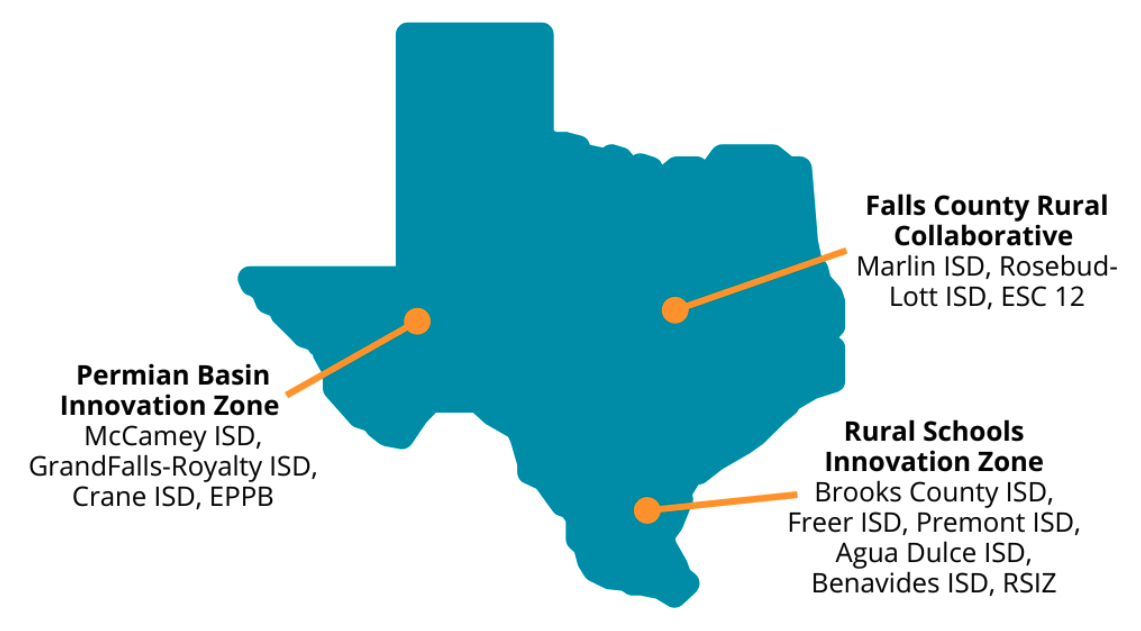Texas Education Agency Designates First Three Rural Pathways Excellence Partnerships
Texas Education Agency designates first Rural Pathways Excellence Partnerships to enhance college and career pathways for rural students

In May 2024, the Texas Education Agency announced the first three collaboratives which have been officially designated as Rural Pathways Excellence Partnerships (R-PEPs).
Falls County Rural Collaborative (FCRC)
- Coordinating Entity: Region 12 Education Service Center
- School District Members: Marlin ISD; Rosebud-Lott ISD
Permian Basin Innovation Zone (PBIZ)
- Coordinating Entity: Education Partnership of the Permian Basin
- School District Members: Crane ISD; Grandfalls-Royalty ISD; McCamey ISD
Rural Schools Innovation Zone (RSIZ)
- Coordinating Entity: Rural Schools Innovation Zone
- School District Members: Agua Dulce ISD; Benavides ISD; Brooks County ISD; Freer ISD; Premont ISD
These R-PEPs are trailblazers in Texas’s rural collaborative space. Through innovation, risk-taking, and collaboration, students in these regions will gain access to high-quality college and career pathways, positioning them for long-term success.
Rural Pathways Excellence Partnerships Overview
House Bill 2209 (Texas 88th Legislature) established the Rural Pathways Excellence Partnership program. This legislation incentivizes small, rural school districts to collaborate with neighboring districts, sharing resources to offer more robust college and career pathways. Many rural districts lack the staffing or facilities to provide the comprehensive Career and Technical Education (CTE) programs available in larger districts. By partnering and leveraging strategic financing and staffing models, these collaboratives can sustain high-quality program options for their students.
R-PEPs must align their pathways with local/regional labor market projections for high-wage, high-demand careers. Managed by a coordinating entity such as an Education Service Center, Workforce Development Board, Institution of Higher Education, or non-profit organization, R-PEPs set ambitious college and career readiness goals and work towards improving student success.
Benefits of R-PEP
Once designated, R-PEP member districts receive new funding to support the collaborative model and financial incentives for graduates who earn postsecondary credentials within five years of high school graduation. R-PEPs can serve more students than individual rural districts, allowing students at one high school to access programs offered at others within the collaborative. This eliminates the need for schools to duplicate programs.
Starting an R-PEP in Your Region
-
Complete TEA’s R-PEP Contact Form: This form notifies TEA staff of your interest in R-PEPs.
-
Initiate Conversations: Talk to neighboring rural districts to gauge their interest in the collaborative model.
-
Apply for a Planning Grant: Available through TEA, this grant funds the initial planning phase.
-
Complete a Planning Year: Use the grant to:
- Identify a coordinating entity
- Engage higher education and workforce development partners
- Conduct a local/regional labor market analysis
- Develop ambitious college and career readiness goals
- Create collaborative staffing and financial models
- Plan to launch the collaborative model the following school year
- Apply for official R-PEP designation with TEA
-
Launch Your R-PEP: After designation, implement your collaborative model.
R-PEP Resources and Technical Assistance Providers
- Texas Education Agency - Develops official R-PEP rules and provides support for development and expansion.
- CareerCraft - Supports labor market analyses, high-quality pathway development, and CCMR & CTE data monitoring.
- Empower Schools - Assists with governance structures, regulatory compliance, and organizational planning.
- Steady State Impact Strategies - Offers guidance on strategic staffing models and executive coaching for R-PEP leaders.
- Texas Impact Network - Connects rural school districts to various entities which provide support related to effective advising, TSIA preparation, and CCMR strategy.
Considering forming a rural collaborative? You don’t have to do it alone. CareerCraft, Empower Schools, and Steady State Impact Strategies have a proven track record of successful collaboration and are available to assist you.
 Shane Thomas
Shane Thomas